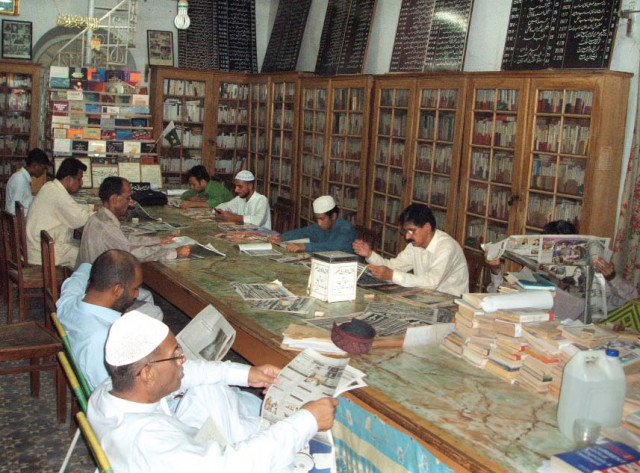The end of an era, older residents reminisce
Back in the 1970s and 80s, people in Sukkur were mad about books but now there are only two libraries left.

The end of an era, older residents reminisce
By now, though, there are only two libraries left.
“That was the golden era,” said a senior citizen and retired government employee, Abdul Qayum. “Everybody used to borrow books from private libraries. It was the best hobby.”
Senior journalist Khawaja Jawed Ahmed said that there was a library in almost every locality. “But now they [libraries] have been replaced by paan shops,” he said. While there was a time when people would go to libraries to gain knowledge, these days it is only to wile away time, Ahmed felt.
Qayum blamed the television for the decline in reading. “Now nobody has the time to read,” he said. “I used to be a member of a library in Mehran Markaz and the librarian charged Rs10 per month,” he recalled.
Another senior citizen and retired deputy secretary of board of intermediate and secondary education, Sukkur, Zahoor Ahmed, repeated similar sentiments. “These days people don’t even have time for their families, how can they read a book?” he asked.
The oldest library in the city, the General Library, still stands as the largest, and in practicality the only, library. The other library, Mir Masoom Shah Library, is run by the taluka municipal administration and has been closed for more than six months due to “necessary repairs and renovation”.
The General Library was established in 1835. It began as a room of books attached to the signaling station, or control room, of the Indus Flotilla Company, which was a ferry service between Sukkur and Karachi during the British rule. At first the library was only meant for employees of the Indus Flotilla Company, who used to live in the signaling station. However, as the number of books grew, the authorities decided to open it for public. In 1893, the library, known as the Signaling Station Library, was registered under the name of General Library and its doors were thrown open for the people of Sukkur.
“Today this library consists of more than 60,000 books, which include English, Urdu and Sindhi literature, books on science, history, gaming, poetry, statistics, sociology, geography, law and many more,” said assistant librarian Mohammad Israr, talking to The Express Tribune. More than 20 English, Urdu and Sindhi newspapers and magazines are also available here, he added.
The General Library is run by the residents of Sukkur. “We do not get a single penny from the government,” said Israr.
According to the assistant librarian, there are 206 lifetime members of the library, who include late Hakeem Mohammad Saeed, Barrister SM Zafar, Senator Islamuddin Shaikh and former Amir Jamaat-e-Islami Qazi Hussain Ahmed
Meanwhile, there are 360 other members who are charged Rs60 per month, said Israr, adding that even this insignificant amount is paid reluctantly by the members. “We have to harass them repeatedly to collect the payments,” he said.
Six years ago, the former district nazim of Sukkur, Syed Nasir Hussain Shah, constructed a separate room in the library for women. However, the room was never opened because they could never get furniture for it.
“Since the government does not provide anything for the library, we are totally dependent on citizens for its upkeep,” Israr said.
The only renovation the library got was a whitewash, which was done 12 years ago. “People like to spend hundreds of thousands on themselves but they cannot look after the only library of the city,” complained the librarian.
He said people are often caught stealing books red-handed but that barely brings any shame. “They just laugh it off,” Israr said incredulously.
While some steal others just forget to return books. “They keep books with them for months at an end and I have to go to their homes to get the books back,” he added.
The assistant librarian did not expect much from the government but he appealed to higher authorities to provide a grant on a yearly basis so they could run the library properly.
Published in The Express Tribune, October 7th, 2010.



















COMMENTS
Comments are moderated and generally will be posted if they are on-topic and not abusive.
For more information, please see our Comments FAQ